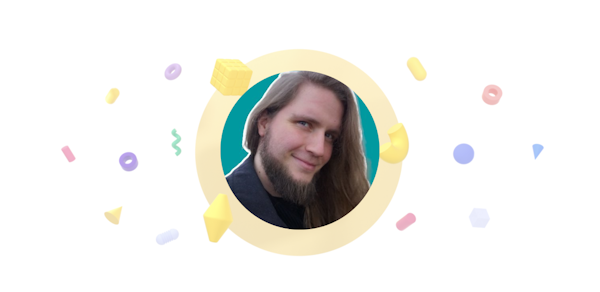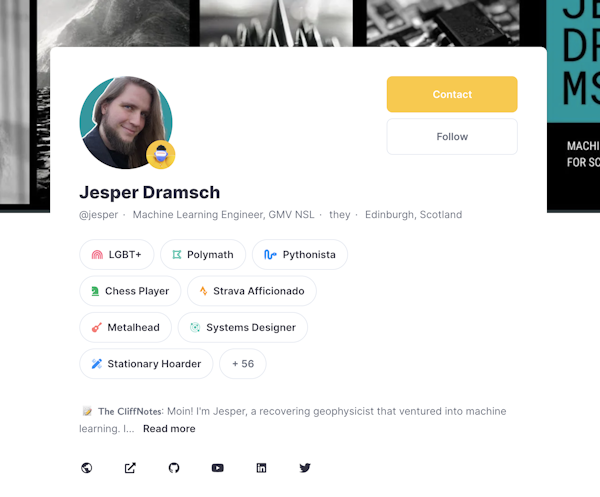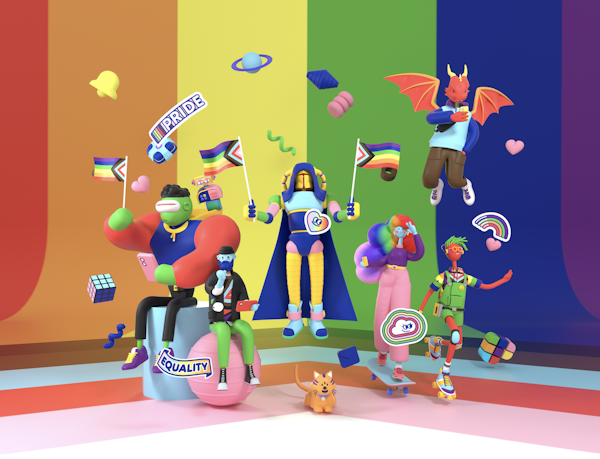Featured Q&A Interview with Jesper Dr.amsch, Machine Learning Engineer at GMV NSL+ lots more!
We are really excited to launch our second ever article for Polyworld Magazine, and our second celebrating our LGBT+ Community Members for #Pride Month 2021! 🏳️🌈💜💚💛💙
Jesper's Bio!
Jesper is a recovering geophysicist that ventured into machine learning based in Edinburgh, Scotland. Jesper's badges include Polymath!! (Go TEAM!! 🥰), Pythonista, Metalhead, Ph.D., Board Gamer and more!
Q: What was your childhood dream job?
A: It was either going to be a mechanical engineer or a game tester. Mechanical Engineer partly because my best friend's father was one, and in part, because I had a slight obsession with Rube Goldberg machines, gears, and computers. And Game Tester, because I loved games and again computers early on and thought it’d be an easy job. I still remember Math Blaster from way back when. Still, this never manifested and is much more work than young me would’ve anticipated.
Q: We see you’ve got the Punstoppable badge, what’s your favourite pun? 😅
A: Some of my favourite jokes in German are “Fusion jokes”, so here goes nothing:
What’s black and white and rocks back and forth? A Swinguin.
Another one you say? What’s yellow and shoots? A Bannon.
Q: What’s the one thing people don’t know about you professionally that you think they should?
Q: What’s the one thing people don’t know about you professionally that you think they should?
A: I still get nervous every time I hit publish, turn on the camera, or step on a stage. Sometimes so much that I can’t sleep. It’s the main reason I’m not more productive as well, that and the perfectionism I still try to get over.
Q: What project are you working on right now that you’re most excited about?
Q: What project are you working on right now that you’re most excited about?
A: Honestly, the thing I’m most invested in right now is a Youtube channel. I’ve been learning about storytelling and editing. Also, honing my speaking skills and making Python, data science and machine learning more accessible to scientists. I started writing a newsletter a while back, and it’s been gratifying, but branching out to video content has been a whole other beast. I love it, but I have so much more to learn to make these things visually and emotionally appealing.
Q: What path led you to becoming a Machine Learning Engineer?
A: In true Polywork fashion, it was a meandering path. I’ve basically started programming when I was 14 and earned some early pocket money by making websites from scratch for local sports clubs. My academic background is in geophysics, and during my Master’s degree, I got a bit distracted. I took additional courses in geology, computer science, philosophy, medicine, and psychology (Education in Germany is free-ish. Highly recommend it.).
I solved a lot of the coursework with a programming approach there. When it came to my PhD in geoscience, I ended up in a course about “advanced image analysis”. One of the last lessons was set up as a competition to write a neural network from scratch to classify MNIST. That tickled my brain in just the right hyperfixating spots. I spent the entirety of two weeks implementing the network, reading up on all the tricks they use in neural network training and researching data augmentation and then some. Then and there, I saw the potential of machine learning to solve a few unsolved problems in geophysics. Luckily my supervisor, to his credit, gave me free rein after I showed some initial results.
After that, I think my big advantage was that I wasn’t shy in sharing my ideas with others. This led to a few very competent friends and me to bounce ideas around for their respective degrees and win a few hackathons, myself becoming fairly successful in writing notebooks on Kaggle and some other cool stuff.
However, since geophysics degrees usually end up in oil & gas, I was at a decision point when I finished up. It was the first time I could’ve easily gotten a job out of any of my degrees. In the end, I decided that it would be best to go a different route and impact the world positively. So now, I have worked on projects that actively assessed the impact of climate change in Somalia and can save lives in transportation and even some in-development satellite technology. Also, I am beyond excited I can share that next step with you! I just signed the contract for a new job and I will be working as a Scientist for Machine Learning at the ECMWF, one of the Coordinated Organisations a bit lesser known than the NATO and ESA. There I’ll get to work on their 10-year machine learning strategy and support domain experts in their weather and climate modelling capacity.
As I said, quite a few meanders and definitely some oxbow lakes along the way.
Q: What’s one thing you wish you knew earlier in your career?
Q: What’s one thing you wish you knew earlier in your career?
A: Everyone feels entitled to an opinion about what you do and especially create. Unfortunately, when you create, some people will steal what you do and pass it off as their own. Both are simply facts I have to accept and be as gracious as possible because the beach doesn’t complain about the ocean.
Q: What does the ideal future of work look like for you when it comes to diversity and inclusion?
A: I changed to a tech-y job (in part) because EDI felt non-existent in my previous career option. Not to say tech doesn’t have problems, but at least it doesn’t feel like fighting windmills. In an ideal future, I’d want women to be able to be as mediocre as some other people. The pressure of being as amazing as the women I worked with, I don’t know how they do it. I obviously want the gender pay gap to close. I’d want it to become normal that no one asks, “but where are you really from?”.
Moreover, I’d love a workplace where people with disabilities can be a part. Especially now that remote work could be more normalised and adaptive technology is getting better. I have this tendency to focus on others struggles, but in the end, I’d love it if the LGBTQIA+ and particularly non-binary and trans folks were treated as equals.
I love collaboration, and every time I had someone from another diverse background drop in with an opinion, it has enriched the conversation. Differing backgrounds in tech will always bring additional mental models to the table, which is vital in building resilient and eventually great applications. In machine learning, this becomes particularly important because no single person can ever think of all the edge cases and implications of models. So effectively, I just hope for a bigger table with more and different voices treated as equals.
Q: Favourite thing about Polywork so far?
The default badges had an incredible variety of things I could identify with, as well as a lot of badges I did not identify with but immediately thought, “oh wow, interesting!”. I can’t wait to see what people will post under these. Also, I love the decision against likes and its implications for all the users' mental well-being.
Q: What kinds of polywork are you most excited about doing in the future?
Q: What kinds of polywork are you most excited about doing in the future?
A: I've just been invited to hold a guest lecture at my old university, which is fantastic. For the first time in my life, I've been asked if I was available for a keynote. Crossing my fingers, that'll work out.
I've always enjoyed creating various types of content in geoscience, from blogs over podcasts to live casts. Now that I'm venturing more into tech, I hope to stay consistent with my newsletter, experiment with media and hopefully collaborate with some interesting people. Riffing with others is something I've always enjoyed and miss a bit these days.





